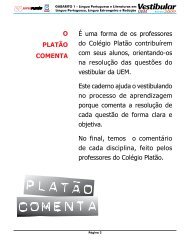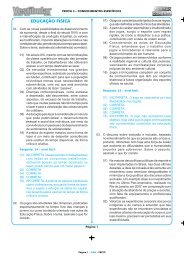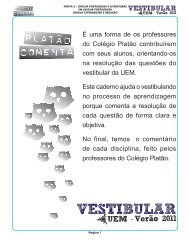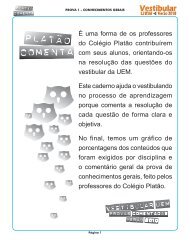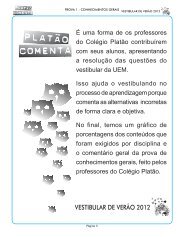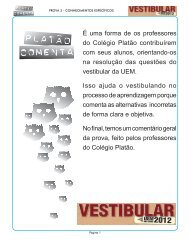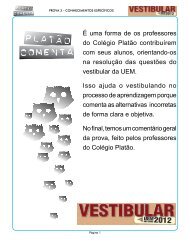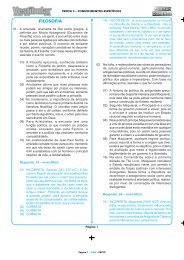Língua Portuguesa e Literaturas em Língua ... - Colégio Platão
Língua Portuguesa e Literaturas em Língua ... - Colégio Platão
Língua Portuguesa e Literaturas em Língua ... - Colégio Platão
Create successful ePaper yourself
Turn your PDF publications into a flip-book with our unique Google optimized e-Paper software.
PROVA 2 - LÍNGUA PORTUGUESA E LITERATURAS<br />
EM LÍNGUA PORTUGUESA E LÍNGUA ESTRANGEIRA<br />
mundo inteiro, como especificado na proposição.<br />
16) CORRETA.<br />
18. Choose the alternative(s) in which the information<br />
about the words from text 1 is correct.<br />
01) “It is very likely” (line 9) is the same as “It’s<br />
probably true”.<br />
02) “several” (line 9) is a quantifier which derives<br />
from the adjective “severe” (line 16).<br />
04) In the extract “Extr<strong>em</strong>e weather events were<br />
devastating in their impacts ...” (lines 14 and<br />
15), the underlined words are an example of<br />
the present progressive tense.<br />
08) “increase” (line 26) and “rises” (line 27) both<br />
mean “become larger in amount, number, or<br />
degree”.<br />
16) The extract “... if average t<strong>em</strong>perature rises,<br />
then so will the number of heat records.”<br />
(lines 27 and 28) is expressed in a conditional<br />
form.<br />
Resposta: 25 - nível médio<br />
01) CORRETA.<br />
02) INCORRETA. O quantificador “several” quer dizer<br />
“vários”, enquanto “severe” significa “severo”, assim<br />
não t<strong>em</strong> nenhuma relação entre eles.<br />
04) INCORRETA. Apesar da palavra “devastating” ter<br />
o sufixo “ing” não pode ser classificada como um<br />
verbo, pois no contexto ela é um adjetivo.<br />
08) CORRETA.<br />
16) CORRETA.<br />
5<br />
10<br />
15<br />
20<br />
25<br />
30<br />
TEXT 2<br />
Stress<br />
Stress is your body’s response to the d<strong>em</strong>ands<br />
placed upon it. A little stress is a good thing, but<br />
too much can have devastating consequences for<br />
your health and relationships.<br />
Everyone needs a certain amount of stress to<br />
live well. It’s what gets you out of bed in the<br />
morning and gives you the vitality to do all sorts<br />
of things.<br />
Stress becomes a probl<strong>em</strong> when there’s too<br />
much or too little. A lack of stress means your<br />
body is understimulated, leaving you feeling<br />
bored and isolated. In an effort to find stimulation,<br />
many people do things that are harmful to<br />
th<strong>em</strong>selves (such as taking drugs) or society (for<br />
instance, committing a crime).<br />
However, too much stress, can result in a<br />
range of health probl<strong>em</strong>s including headaches,<br />
stomach upsets, high blood pressure and even<br />
stroke or heart disease. It can also cause feelings<br />
of distrust, anger, anxiety and fear.<br />
People often feel over-stressed as a result of<br />
some event. This doesn’t have to be negative<br />
(such as the death of a loved one, redundancy or<br />
divorce); it can also be se<strong>em</strong>ingly positive (a new<br />
partner, new job or going on holiday).<br />
Among the bad stressbusters, it is possible to<br />
mention drinking alcohol, denying the probl<strong>em</strong>,<br />
taking drugs, overeating and smoking cigarettes.<br />
On the other hand, the good techniques to avoid<br />
stress are taking a nap; getting a massage;<br />
expressing yourself artistically; having a laugh;<br />
being gentle to yourself; and making use of<br />
meditation and relaxation techniques.<br />
Que<br />
Choo<br />
the w<br />
01) T<br />
02) T<br />
1<br />
04) T<br />
an<br />
o<br />
08) T<br />
h<br />
re<br />
fi<br />
16) T<br />
(l<br />
to<br />
Qu<br />
Choo<br />
01) S<br />
to<br />
02) P<br />
st<br />
04) L<br />
g<br />
08) If<br />
p<br />
16) O<br />
sh<br />
(Texto adaptado, disponível <strong>em</strong> . Acesso<br />
<strong>em</strong> 28/3/2012)<br />
Página 17<br />
19. Choose the alternative(s) in which the information<br />
about the words extracted from text 2 is correct.<br />
01) The pronoun “it” (line 2) refers to “stress” (line 1).<br />
02) The adjectives “bored” (line 12) and “harmful”<br />
(line 13) are used in a negative context.<br />
04) The prefixes “under”, in “understimulated” (line<br />
11), and “over”, in “over-stressed” (line 21),<br />
express opposite meanings.<br />
08) The word “result” in “... can result in a range of<br />
health probl<strong>em</strong>s ...” (lines 16 and 17) and “...<br />
as a result of some event.” (lines 21 and 22)<br />
is used in the first extract as a verb and in the<br />
second as a noun.




